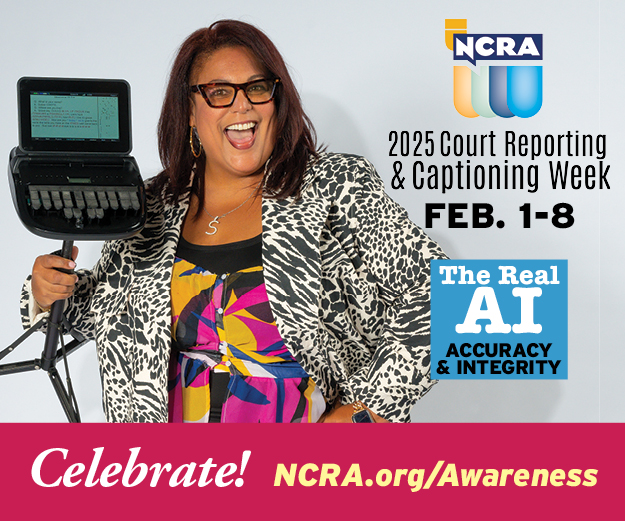
The Future of Court Reporting: Technologies and Patterns Forming the Industry
As you discover the future of court reporting, you'll observe a shift driven by modern technology and innovation. Real-time transcription and AI applications are reshaping just how legal proceedings are documented. With remote depositions obtaining traction, the landscape is progressing swiftly. It questions concerning the role of stenotype reporter and the abilities they'll need moving ahead. What does this mean for experts in the area? The answer might shock you.
The Impact of Artificial Knowledge on Court Reporting
As expert system proceeds to advance, it's improving the landscape of court coverage in means you could not anticipate. You might find that AI tools are improving tasks typically dealt with by human reporters, enabling greater efficiency. AI can examine large amounts of legal text, assisting you recognize pertinent precedents and improve case preparation. You'll also notice AI-driven applications aiding in record administration, making it much easier for you to arrange and fetch crucial details rapidly.
Additionally, AI can enhance the prep work process by providing anticipating analytics, which can help you expect test outcomes based on historical information. With AI handling regular tasks, you can concentrate more on your core obligations, such as ensuring precision and giving vital lawful insights.
Real-Time Transcription: Enhancing Accuracy and Performance
Real-time transcription has actually changed the court reporting process, making it easier than ever before for you to catch accurate documents instantly. With sophisticated innovation, you can currently supply instant records during hearings or depositions, guaranteeing that all parties have access to vital info without delay. This immediacy not only enhances the overall efficiency of the lawful procedure yet additionally permits you to concentrate on the discussion, as opposed to scrambling to catch up.
As you use real-time transcription, you'll observe a considerable reduction in errors, thanks to automated checking devices that flag incongruities as you kind. Furthermore, clients appreciate the ability to assess records immediately, enabling quicker decision-making and smoother proceedings. By welcoming this technology, you're not simply enhancing your workflow; you're establishing a brand-new standard in court coverage that focuses on accuracy and performance. This forward-thinking strategy placements you at the leading edge of the evolving lawful landscape (court reporting).
The Increase of Remote Depositions

With the growing demand for versatility in lawful proceedings, remote depositions have become a game-changer in court reporting. You can now get involved in depositions from anywhere, eliminating travel time and expenses. This ease allows you to focus on what genuinely matters-- preparing your instance.
Remote depositions use sophisticated modern technology, enabling real-time interaction and file sharing. You can involve with witnesses and attorneys perfectly, making particular that everyone remains linked no matter of their physical place. This technique not only saves time yet additionally increases your swimming pool of specialist witnesses, as geographical obstacles come to be much less of a problem.
As remote depositions gain popularity, it's vital to adjust to this new norm. Familiarize on your own with the necessary devices and methods to ensure a smooth experience - court reporting. Accepting this advancement can offer you an one-upmanship, enabling you to navigate the ever-evolving landscape of legal proceedings effectively
Digital Courtrooms: Changing the Lawful Landscape
As you enter the world of electronic courts, you'll notice just how online hearing technology is reshaping lawful procedures. This shift not only makes access less complicated however additionally improves transcription precision, guaranteeing every word is recorded properly. Welcoming these improvements can considerably enhance the efficiency of the legal procedure.
Online Hearing Innovation
While the conventional court room setting has actually long been a symbol of justice, the surge of virtual hearing modern technology is reshaping just how lawful proceedings are performed. You'll find that these digital systems provide extraordinary ease of access, permitting participants to join from anywhere. This versatility not just saves time but likewise lowers costs connected with traveling and logistics. Envision being able to provide your instance without tipping foot in a physical courtroom. Additionally, digital hearings can boost participation, making it possible for visit this web-site witnesses and specialists to supply testament without the constraints of area. As you adapt to these modifications, you'll observe that virtual hearings preserve the stability of the legal procedure while accepting advancement, ultimately transforming the way justice is served in the modern world.
Boosted Transcription Accuracy
Improved transcription precision is revolutionizing the lawful area, making court proceedings more reputable than ever before. With innovations in speech recognition technology and AI-driven devices, you can anticipate to see a substantial reduction in transcription errors. These developments not only record every word spoken but also make up subtleties in tone and context, boosting overall comprehension. Therefore, important information aren't lost in translation, guaranteeing that the stability of the legal procedure is kept. In addition, real-time transcription permits you to gain access to exact records quickly, helping with smoother interaction during tests. Embracing these innovations means you're tipping right into a future where quality and precision in lawful documentation are vital, ultimately profiting all events associated with the judicial system.
The Duty of Court Reporters in Virtual Hearings
Court press reporters play a vital role in online hearings, ensuring that every word spoken is precisely recorded and recorded in real-time. As a stenotype reporter, you help with communication between celebrations, making complicated lawful process accessible. Your experience in lawful terminology and the ability to quickly adjust to different speakers are important in this digital setting.
Throughout online hearings, you maintain a steady emphasis, even among technological difficulties or disturbances. You supply a clear, written record that can be referenced later on, assisting courts, lawyers, and clients recognize the procedures. Your skills in guiding different systems ensure that you can seamlessly incorporate into any kind of online arrangement.
Moreover, you additionally assist copyright the stability of the judicial procedure, verifying that every participant's voice is heard. By doing this, you not just improve the efficiency of legal process however also add to the general fairness and transparency of the justice system.
Developments in Documentation and Record Keeping
As innovation progresses, innovations in paperwork and record keeping are changing just how court press reporters capture and handle lawful transcripts. You'll discover that electronic tools permit quicker and a lot more accurate transcription, lowering the chances of human error. Cloud-based storage space services enable you to safely save and access records from anywhere, find more info making partnership with legal groups smooth.
Expert system is also playing a substantial duty, helping with real-time transcription and also using clever editing and enhancing features. These developments not just enhance effectiveness but likewise guarantee that you can provide top notch documentation in a hectic lawful setting.
Additionally, the combination of voice recognition software application simplifies the process, permitting you to focus extra on the subtleties of the process instead than just inputting. By welcoming these advancements, you're positioned to raise your skills and satisfy the needs of contemporary court reporting effectively.
Future Abilities and Training for Court Reporters
While technology reshapes the landscape of lawful procedures, it's essential for stenotype reporter to adapt by obtaining brand-new abilities and training. You'll require to familiarize on your own with sophisticated transcription software and digital reporting tools to remain competitive. Embracing synthetic knowledge and real-time captioning will boost your performance and accuracy.
Additionally, establishing solid study and analytical skills is essential. You'll commonly run into complex legal lingo and treatments, so understanding legal principles will certainly hone your coverage. On-line courses and workshops can provide valuable understandings right into these areas.
Connecting with other specialists will certainly likewise aid you remain upgraded on sector trends. Joining companies or going to meetings can expose you to new innovations and best techniques.
Ultimately, developing your social skills will improve communication with lawyers and customers. By focusing on these locations, you'll position on your own for success in the developing field of court reporting.
Regularly Asked Questions

What Qualifications Are Required to Become a Stenotype Reporter Today?
To end up being a stenotype reporter today, you'll need a high college diploma, specialized training in court reporting, and accreditation, typically with a national test. Solid keying skills and attention to information are necessary for success.
Exactly How Can Court Reporters Keep Updated With New Technologies?
To stay updated with brand-new innovations, you must go to workshops, join professional companies, and sign up for pertinent magazines. Networking with peers and taking part in online discussion forums can also maintain you informed regarding the most recent try these out advancements.
What Is the Average Salary for Court Reporters Currently?
The ordinary wage for court press reporters differs by place and experience, yet you can anticipate around $50,000 to $70,000 annually. In some locations, experienced press reporters can earn even more, specifically with specialized abilities.
Exist Task Opportunities for Court Reporters in Non-Legal Fields?
Yes, there are work possibilities for stenotype reporter in non-legal fields. You can find roles in shut captioning, transcription services, and media, where your skills in catching talked language are highly valued and demanded.
Exactly How Does Court Coverage Differ in Various Countries?
Court reporting varies significantly throughout nations. You'll locate distinctions in terminology, modern technology, and lawful systems. As an example, some nations emphasize electronic reporting, while others still count on standard stenography techniques for capturing talked words.
Comments on “How court reporting Has Advanced With New-Age Stenography Machines”